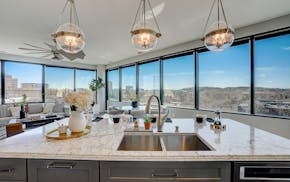Rachel Maloney's kitchen counters contain crushed walnut shells. The locally made cabinets are formaldehyde-free. The backsplash tile is composed of waste glass. In fact, Maloney's Craftsman-style kitchen could have been lifted from the showroom of Natural Built Home, the eco-conscious business she founded. Maloney sold it last week and plans to continue to work there as a consultant.
In 2005, when only a few people knew -- or cared -- what VOC stood for, Maloney began offering environmentally friendly building and finishing materials to homeowners, first from a website and, later, from a retail store in south Minneapolis.
"My husband and I had bought this new house and we wanted to paint the white walls yellow and green, but we couldn't find healthy nontoxic paint that wouldn't give us a headache," said Maloney. "I decided to start a business where consumers can find these products and also become educated about the differences."
For the seventh year, Maloney and other eco-conscious experts and organizations will advocate green living at the Minnesota State Fair's Eco Experience. We caught up with her to talk about her pioneering business, the comeback of linoleum and the alternative to granite.
Q The green-building movement was still on the fringes when you started your business. Why did you decide to take the gamble?
A I saw the benefits of having all different kinds of products in one place -- nontoxic countertops, healthy paints and water-saving toilets -- so people could see and touch them.
Q What was the response?
A The first customers were hard-core green folks. Over the years, the clientele has evolved, and people are coming in for so many different reasons. A new mom might be looking for nontoxic paint for the nursery. They're not necessarily people who drive a Prius and have solar panels on their roof. Some people just think the products are beautiful, like recycled-glass countertops. The fact that it's made of recycled glass and locally produced is a bonus.
Q Name some of the most unusual materials at the store.
A We have insulation made of recycled denim jeans and countertops of crushed walnut shells. MIO wall tile is made from recycled paper that has the consistency of egg cartons. You can paint them and make wall art in a kid's room.
Q What are the most popular items?
A Recycled-glass countertops have become an alternative to granite. Marmoleum floors are back for kitchen remodels and give a pop of color. It's super fun with lots of colors, easy to clean and made from linseed oil, which is naturally antibacterial. Cork flooring has been around for a long time, but the last three years, it's really taken off.
Q How have green products changed?
A More manufacturers have expanded their lines in a wider range of prices, and the design is more beautiful. We carried one brand of dual-flush toilets and now we have three. Strand-woven bamboo is a new technology that wasn't around then, and it's changed the green flooring industry.
Q What's green in your home?
A Everything in my kitchen -- the Fireclay tile backsplash is made of 70 percent recycled materials, and the door and drawer pulls are from recycled bronze. We used zero-VOC paint on the walls.
Q Sustainable construction and nontoxic materials are more commonplace. How has that changed the Eco Experience?
A The first year of the Eco Experience, people asked "What's the deal?" and were puzzled about the products. When I told them about formaldehyde and VOC, their eyes would glaze over. Now they come to me and ask how many VOCs are in certain products. It makes me feel good that people realize it's important to their health and the environment.
Lynn Underwood • 612-673-7619
Here's how Phish is using the Sphere's technology to give fans something completely different
4/20 grew from humble roots to marijuana's high holiday

